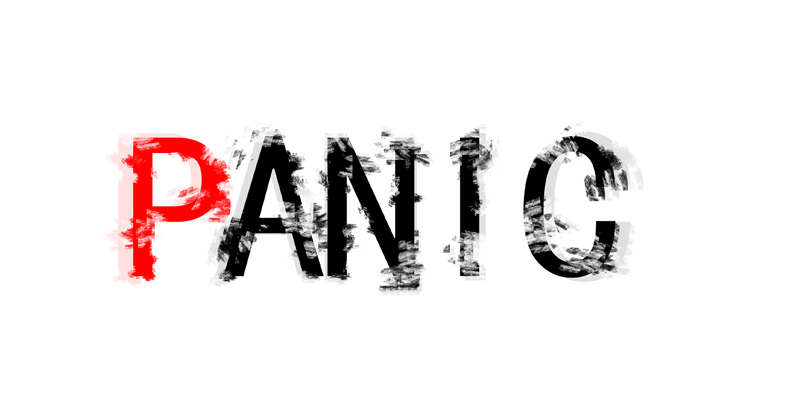2.3 The role of interpretations in panic attacks
Research suggests that more than one in ten people will experience a one-off panic attack in their lifetime but that only somewhere between one in twenty or one in sixty will go on to develop full blown panic disorder. So why do only a minority of those who have panic attacks actually develop panic disorder? In line with the cognitive model of panic disorder, one idea with research support is that it is those people who have catastrophic interpretations who are more likely to develop panic disorder. Given their importance the next section focuses on learning more about catastrophic appraisals.
To understand this more you are now going to read a description of a panic attack written by a man called Stanley Law.
Activity 7 Identifying interpretations
In this extract Stanley describes his first panic attack, which occurred after a prolonged period of hard work and frightening experiences in the Blitz during the Second World War. He had recently married and was taking a much needed holiday in Wales.
As you read, think about how Stanley Law interpreted (made sense of) his panic attack. What did he think it was? What did he think was happening and what did he think was going to happen next? You should also reflect on what you think may be happening.
Stanley Law’s experience of panic
On the morning of the fifth day I went for a haircut and shampoo, arranging to meet my wife later by the big clock near the pier. I had to wait some forty minutes before my turn came to occupy the chair, and I began to feel uneasy. For the first 20 minutes I felt no more than a pleasant languor, a not uncomfortable and unnatural feeling for someone on holiday. This sensation slowly dispersed to be replaced by a growing rigidity I couldn’t understand. I began to long for the procedure to be over, I longed to get outside again. I felt I would be all right once I got out into the sparkling sunlight.
Yet to get up and leave would have seemed absurd, especially after waiting so long. The haircut itself went off all right, the barber chatting away blithely. I bent over the bowl for the shampoo, and the tension began to build up again. With tremendous relief I sat back and waited for my hair to be dried. Usually, of course, an electric hot-air blower was used for this purpose, but this establishment didn’t seem to boast such modern luxuries. The man picked up a towel and rubbed away vigorously.
… sensations stronger and stranger than any I had previously known charged through my body. My throat seemed on fire; it screamed for water; gasping, my heart thundering away, I thought my hour had come. I jumped up, threw money towards the barber, and stumbled into the street.
Trembling violently, I staggered towards the clock at the head of the pier. Desperately I looked around for my wife; at that moment I felt only the appearance of Joyce would save me. There was no sign of her, and another seizure, even more powerful, came swiftly upon me. I tried to walk away, but I couldn’t. I held myself rigidly, my legs seemed fastened to lead weights, but I managed to move a yard or so. My whole body jerked as though subjected to an electric shock. Coiled up like steel wire, I turned and twisted to try to remove the devilish feelings that possessed me. I closed my eyes, but this made matters worse. Head swimming, a flash of light seemed to flood into me increasing in power and evil.
Almost screaming, collapsing to my knees, I shook my head violently. Everything seemed to disintegrate. Twitching and trembling, I tried to thrust the evil sensations from me. The taking of breath was almost impossible and my heart was racing. My throat was burning, it closed like a vice, and each time I moved a fear-ridden spasm charged through me.
Gasping hard, I staggered to my feet in an effort to escape from this evil thing that threatened to rob me of my identity, of my life. Through glazed eyes I frantically searched round for Joyce, but all I could see was the ghostly outline of people passing to and fro and past me.
Heart thudding, my body pouring sweat, I made a final effort in a grotesque struggle for air and for life. Despairingly, I threw myself into the road. Then someone was trying to lift me, speaking to me and supporting me.
‘What’s the matter?’ said a man’s voice. ‘What’s the matter?’
This vivid and descriptive personal account of Stanley suffering his first panic attack offers an attempt to put his horrifying experience into words. At several points throughout his experience, he tries to make sense of what was happening to him. Can you pick out any interpretations that he makes? Write them in the text box below.
Discussion
Some key interpretations that Stanley makes are in bold.
On the morning of the fifth day I went for a haircut and shampoo, arranging to meet my wife later by the big clock near the pier. I had to wait some forty minutes before my turn came to occupy the chair, and I began to feel uneasy. For the first 20 minutes I felt no more than a pleasant languor, a not uncomfortable and unnatural feeling for someone on holiday. This sensation slowly dispersed to be replaced by a growing rigidity I couldn’t understand. I began to long for the procedure to be over, I longed to get outside again. I felt I would be all right once I got out into the sparkling sunlight.
Yet to get up and leave would have seemed absurd, especially after waiting so long. The haircut itself went off all right, the barber chatting away blithely. I bent over the bowl for the shampoo, and the tension began to build up again. With tremendous relief I sat back and waited for my hair to be dried. Usually, of course, an electric hot-air blower was used for this purpose, but this establishment didn’t seem to boast such modern luxuries. The man picked up a towel and rubbed away vigorously.
… sensations stronger and stranger than any I had previously known charged through my body. My throat seemed on fire; it screamed for water; gasping, my heart thundering away, I thought my hour had come. I jumped up, threw money towards the barber, and stumbled into the street.
Trembling violently, I staggered towards the clock at the head of the pier. Desperately I looked around for my wife; at that moment I felt only the appearance of Joyce would save me. There was no sign of her, and another seizure, even more powerful, came swiftly upon me. I tried to walk away, but I couldn’t. I held myself rigidly, my legs seemed fastened to lead weights, but I managed to move a yard or so. My whole body jerked as though subjected to an electric shock. Coiled up like steel wire, I turned and twisted to try to remove the devilish feelings that possessed me. I closed my eyes, but this made matters worse. Head swimming, a flash of light seemed to flood into me increasing in power and evil.
Almost screaming, collapsing to my knees, I shook my head violently. Everything seemed to disintegrate. Twitching and trembling, I tried to thrust the evil sensations from me. The taking of breath was almost impossible and my heart was racing. My throat was burning, it closed like a vice, and each time I moved a fear-ridden spasm charged through me.
Gasping hard, I staggered to my feet in an effort to escape from this evil thing that threatened to rob me of my identity, of my life. Through glazed eyes I frantically searched round for Joyce, but all I could see was the ghostly outline of people passing to and fro and past me.
Heart thudding, my body pouring sweat, I made a final effort in a grotesque struggle for air and for life. Despairingly, I threw myself into the road. Then someone was trying to lift me, speaking to me and supporting me.
‘What’s the matter?’ said a man’s voice. ‘What’s the matter?’
An early thought is that the bodily sensations he is experiencing means that he is going to die (‘I thought my hour had come’). He then has the thought that only his (absent) wife can save him from death (‘I felt only the appearance of Joyce would save me’). Next, he interprets the bodily sensations he is experiencing as ‘devilish’ and a sign that he is being possessed by evil. This evil is not only trying to kill him but also trying to erase him (‘rob me of my identity’). Given the way Stanley is interpreting what is happening to him it is perhaps not surprising that he is panicking.

